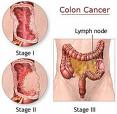|
|
|
|
Colon cancer
is cancer of the large intestine (colon), the lower part of your digestive system. Rectal cancer is cancer of the last 6 inches
of the colon. Together, they're often referred to as colorectal cancers. About 112,000 people are diagnosed with colon cancer
annually, and about 41,000 new cases of rectal cancer are diagnosed each year, according to the American Cancer Society. Most
cases of colon cancer begin as small, noncancerous (benign) clumps of cells called adenomatous polyps. Over time some of these
polyps become colon cancers. Polyps may be small and produce few, if any, symptoms. Regular screening tests
can help prevent colon cancer by identifying polyps before they become cancerous. If signs and symptoms of colon cancer do
appear, they may include changes in bowel habits, blood in your stool, persistent cramping, gas or abdominal pain. Symptoms Many
people with colon cancer experience no symptoms in the early stages of the disease. When symptoms appear, they'll likely vary,
depending on the cancer's size and location in your large intestine. Signs and symptoms
of colon cancer include:
Blood in your stool may be a sign of cancer, but it can also indicate other conditions. Bright red blood you notice on bathroom tissue more commonly comes from hemorrhoids or minor tears (fissures) in your anus, for example. In addition, certain foods, such as beets or red licorice, can turn your stools red. Iron supplements and some anti-diarrheal medications may make stools black. Still, it's best to have any sign of blood or change in your stools checked promptly by your doctor because it can be a sign of something more serious.
[ Back ]
|
|
|
|
